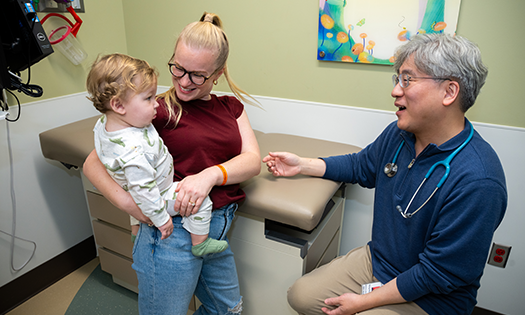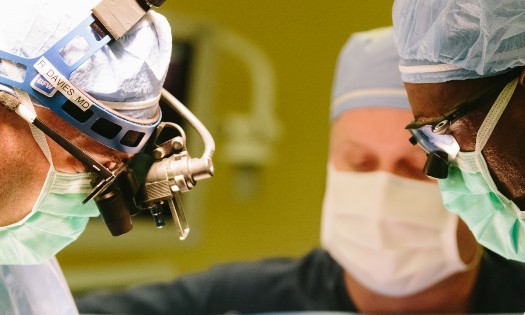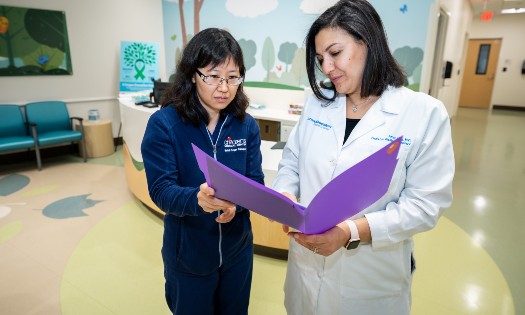In August 2023, transplant teams at Children’s Medical Center Dallas, part of the Children’s Health℠ system, performed one of the first-ever pediatric multi-organ transplants at a standalone children’s hospital using normothermic machine perfusion (NMP).
Transplant surgeons performed a complex 17-hour heart-liver transplant on a 19-year-old female patient. The transplant illustrates the benefits of NMP – an innovative technology that shows promise in helping more children get the transplants they need to lead longer, fuller lives. The Pediatric Solid Organ Transplant Center at Children’s Health is among an elite handful of children’s hospitals in the country utilizing this cutting-edge technology.
Improving transplant success with machine perfusion
Children’s Health employs the TransMedics Organ Care System™ (OCS), which was approved by the FDA in September 2021.Christine Hwang, M.D., Pediatric Liver Transplant Surgeon at Children's Health and Associate Professor at UT Southwestern, was active in an international randomized NMP clinical trial for adult liver transplants and performed the nation’s first pediatric liver transplant using NMP in October 2022. Ryan Davies, M.D., Pediatric Cardiothoracic Surgeon at Children’s Health and Associate Professor at UT Southwestern, first used NMP for a heart transplant in June 2023.
The surgeons embraced this approach for the 19-year-old patient, who was born with hypoplastic left heart syndrome (HLHS) and underwent three open-heart surgeries – including the Fontan procedure – as an infant. After these procedures, an estimated 1 in 3 children will develop post-Fontan single ventricle heart failure (Fontan failure) by age 20. Fontan-associated liver and kidney problems are also common.
Benefits of machine perfusion for organ transplants
The patient had been hospitalized for two months with heart and liver failure before the transplant took place. She recovered for a month in the hospital before discharge and is doing well after a brief rehospitalization to place a stent to open a narrowed bile duct connection. Her recovery illustrates the potential for NMP to help other pediatric patients.
Here are what Dr. Davies and Dr. Hwang see as six of the key benefits of using NMP for this complex procedure:
1: Improved organ viability
Donor organs are traditionally placed in cold storage during transport. “The organ doesn’t get blood, oxygen or nutrients, which can lead to ischemic cell damage and decompensation,” says Dr. Davies.
With machine perfusion, donor organs immediately go on a pump device after surgical removal. The machine circulates warm, oxygen- and nutrient-rich blood through the organ, mimicking what would occur inside the body. The heart perfusion machine also keeps the heart pumping and circulating blood.
Transplant teams can continually test the organ’s function while it’s on the device and infuse nutrients or medications into it if needed to improve function.
2: Extra time to perform complex heart procedures
Donor hearts on cold storage are viable for 4 to 6 hours. Because NMP keeps the donor heart in a metabolically active pumping state suffused with oxygen-rich blood, the heart can stay viable for transplantation for up to 16 hours (although under 8 hours is optimal).
This extra time is especially helpful when performing complex procedures on patients who’ve had multiple heart surgeries, which can take longer due to scar tissue and previously repaired blood vessels.
“With this patient, we had to remove the pulmonary artery connections from the earlier heart surgeries and then reconstruct the pulmonary arteries into a normal configuration before we could start the transplant process,” says Dr. Davies. “With a heart in cold storage, the timing has to be perfect to prevent ischemia. Any unexpected anatomical challenges in the recipient during reconstruction surgery can affect the timing and lead to the new heart not working well.”
3: More breathing room between multi-organ transplants
With a double-organ transplant, NMP keeps the second organ healthy (in this case, the liver) while surgeons implant the donor heart and ensure it works after transplantation. “In the past, we would have faced tighter time constraints between the first and second organ transplants,” says Dr. Hwang. “Having the liver on perfusion eased this time pressure.”
4: Expanded access to donors
Donor organs traditionally come from people who experience brain death. Machine perfusion makes organ donation after circulatory death (DCD) more viable as it allows the transplant team to assess organ viability. “Before perfusion, we rarely used these organs in pediatric transplantation because of the risk they might not function,” says Dr. Hwang. “NMP increases the number of organs available for transplant by expanding the donor pool criteria.” Because organs stay viable longer on perfusion, teams can also accept organs from locations once considered too far away.
Of the seven heart transplants performed at Children’s Health in 2023 using machine perfusion, five donor hearts came from nonstandard donors. One patient had been waiting four years for a transplant. NMP has the potential to reduce this wait time by increasing the pool of viable organs; a study on adult liver transplants showed that NMP led to the successful transplantation of 15 of 21 organs that once would have been deemed unusable.
5: Fewer post-transplant complications
Results from the OCS Liver PROTECT clinical trial found that NMP reduces the risk of liver bile duct complications by as much as 83% six months after transplant compared to cold storage. “There’s also a significantly lower chance of early allograft dysfunction and postreperfusion syndrome, which often means an easier recovery, shorter hospital stay and a successful transplant outcome,” says Dr. Hwang.
6: More surgeons on-site
Children’s Health utilizes TransMedics’ organ procurement services. With TransMedics, surgeons from across the country retrieve donor organs and place them on perfusion. A technician stays with the perfused organ until transplantation. “Our teams remain fully staffed because we don’t have to send one of our surgeons to recover the organ,” says Dr. Davies.
Why Children’s Health: Leaders in Transplant Innovations and Care
Children’s Health is home to one of the world’s largest pediatric heart transplant programs and the only one in North Texas. Our heart transplant team performed 36 heart transplants in 2023. Seven transplants, including the heart-liver procedure, used NMP. We also have the only liver transplant program in North Texas and a comprehensive, multidisciplinary Pediatric Liver Disease Center.
“By expanding access to donor organs, NMP has the potential to get more children off the transplant wait list faster,” says Dr. Davies.
Learn more about our innovative Pediatric Solid Organ Transplant Center at Children’s Health. >>


